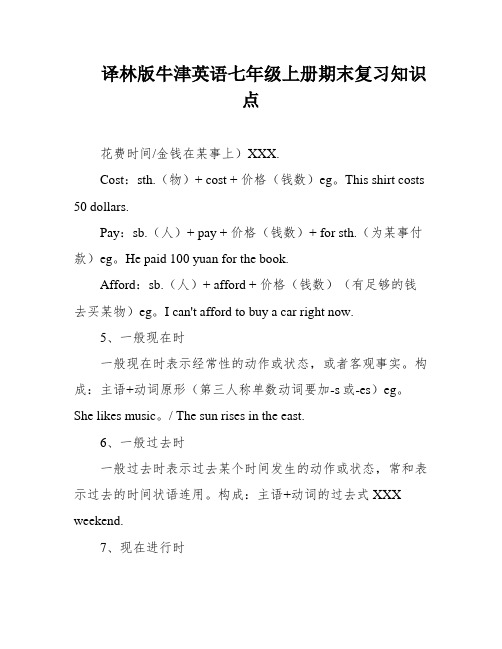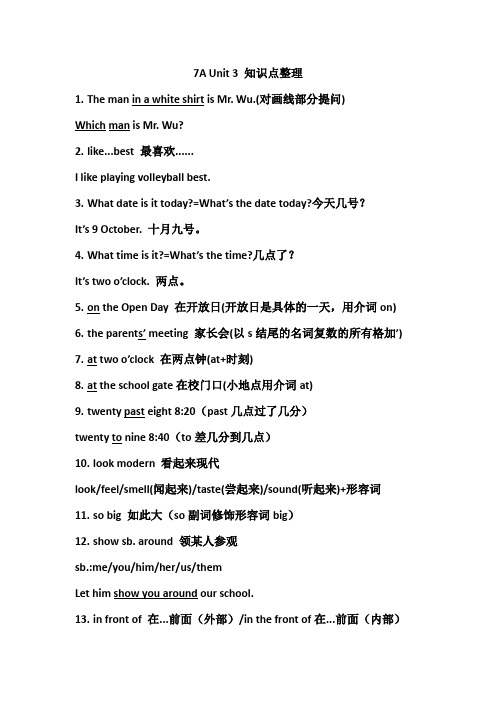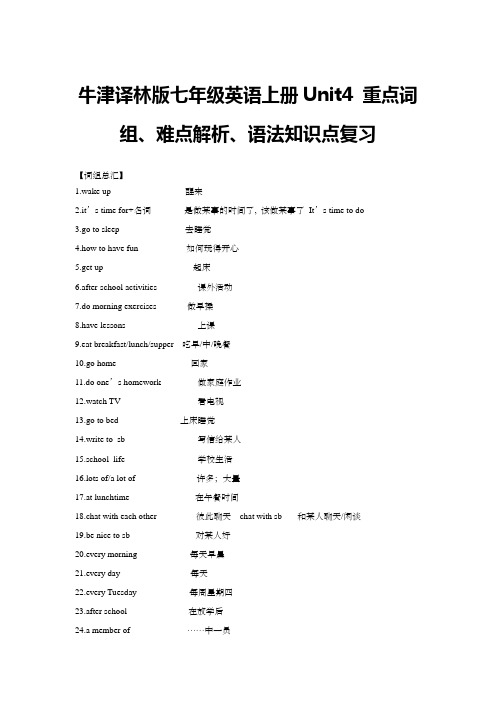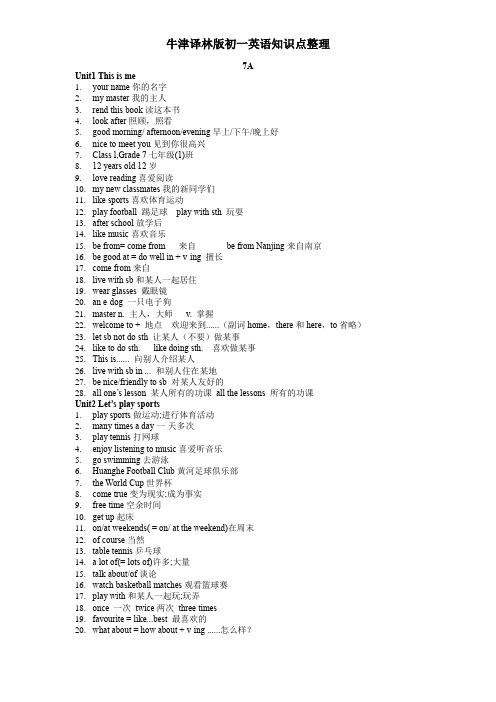译林牛津初一上册英语知识点归纳
牛津译林版英语七年级上册各单元知识点归纳

牛津译林版英语七年级上册各单元知识点归纳牛津译林版英语七年级上册各单元知识点归纳Units1--41、喜欢like / love / enjoy / be interested in / be crazy about (痴迷于)/ have fun / have a good time +doing sth.动词+doing 的还有Go doing sth. / finish doing sth./Be good at doing sth./ do well in doing sth.How/what about doing sth./practise doing sth.2、“四大看”read vt.看读物(read books/newspaper/magazines/a map等)look vi. 瞧常用短语look at/ for/around/after/out/over/upsee vt.看见,强调结果I can see you.watch vt.带有欣赏性的观看watch TV/ a film / a football game3、“五大穿着”Put on 强调“穿上”的动作eg. He ____a coat and goes for a walk.Wear 强调“穿着”的状态;进行时态表示暂时的情况eg. She is wearing a new skirt now. / wear glassesDress (1)dress sb. (2) dress oneself (3) dress up as (4) get dressedIn (穿戴)后接颜色(或衣服),表示状态look!Lucy is_____a red skirt and a pair of pink shoes.On 后接人指衣服穿在某人身上看出区别来。
The red coat looks nice on you.4、“四大花费”Spend:sb.(人)+ spend + 时间/金钱+ on sth.sb.(人)+ spend + 时间/金钱+(in) doing sth.pay:sb.(人)+pay + 金钱+for sth.cost:sth.(物) + cost + sb.+金钱Doing sth.costs + sb.+时间take:it takes sb. +时间+ to do sth.5、“三大地点副词”Home / there /here 前不加任何的介词welcome home / come here / go there6、“三大使役动词”Make sb. do sth./ have sb. do sth. / let sb.do sth.7、见面打招呼用语(1)Nice to meet you . (2) Glad to meet you . (3) How are you ? (4) How are you doing ?(5)How is it going ? (6)How is everything going? (7) What’s up?8、基数词+year(s)+old 表示“…岁”提问用“how old”名词性短语数词-year-old 也表示年龄,但其为形容词性短语“前有冠词后有名(词)”Eg. Helen is 11 years old = Helen is an 11-year-old girl.9、Let’s 与let us 的区别Let’s do sth. 指包括听者(对方)和说者(我们)都在内,表示建议Let us do sth.指“让(允许)我们做某事”而听者(对方)不做,只有“我们”做10、play+the+乐器类名词e.g. Play the pianoPlay + 球类运动play+ football / play cards / play chess11、She comes from Shanghai= She is from Shanghai . 注:如何提问Shanghai 及如何改一般疑问句12、be good at =do well in = be clever at = study sth. wellBe good at (反) be bad at do well in (反) be poor in13、介词over的用法(1)”在…正上方” There is a bridge over the river.(2)”越过” A plane flies over the house(3)”超过” There are over 20 boys in this class.(4)”结束” Class is over! / Game is ove r.14、every one 与everyone 辨析区别(1)Every one 可以与of 连用,而everyone 却不能与of连用Eg.every one of the children likes playing the computer games.(2) everyone 只指人=everybody而every one 既指人又可指物共同点:谓语动词都要用“三单”15、family 的用法:“家庭”作为整体谓语动词用“单数”He has a big family.“家人”强调成员,是复数含义,谓语动词用“原形” My family are at home.拓展:集体名词有people、class、police、sheep、deer、furniture等16、all/ both/ each/every/neither/ either 的用法all (1)三者或三者以上“全部、都”(2)all + the + 名词(all the afternoon = the whole afternoon)(3)all 放在行为动词前,名词前;be 动词后(4) all of +宾格/名词复数Both(1)两者都(2)后可跟of +宾格/名词复数Both sides of the street are grown trees.Each 指两个或两个以上“每一个”个体Each side of the street is grown trees.Every 指许多人或事物的“全体”后接名词单数Every student is here . 所有人都在。
译林版牛津英语七年级上册期末复习知识点

译林版牛津英语七年级上册期末复习知识点花费时间/金钱在某事上)XXX.Cost:sth.(物)+ cost + 价格(钱数)eg。
This shirt costs 50 dollars.Pay:sb.(人)+ pay + 价格(钱数)+ for sth.(为某事付款)eg。
He paid 100 yuan for the book.Afford:sb.(人)+ afford + 价格(钱数)(有足够的钱去买某物)eg。
I can't afford to buy a car right now.5、一般现在时一般现在时表示经常性的动作或状态,或者客观事实。
构成:主语+动词原形(第三人称单数动词要加-s或-es)eg。
She likes music。
/ The sun rises in the east.6、一般过去时一般过去时表示过去某个时间发生的动作或状态,常和表示过去的时间状语连用。
构成:主语+动词的过去式XXX weekend.7、现在进行时现在进行时表示现在正在进行的动作,常和now。
XXX。
currently等时间状语连用。
构成:主语+be动词(am/is/are)+动词-XXX.8、一般将来时一般将来时表示将来某个时间要发生的动作或状态,常和表示将来的时间状语连用。
构成:主语+will/shall+动词原形eg。
I will go to Beijing next month。
/ She shall visit her XXX.9、情态动词情态动词有can/could。
may/might。
must。
shall/should。
will/would。
ought to等。
它们的用法有所不同,但都表示某种语气或情态。
eg。
You should study hard for the exam。
/ She must be at home now.10、被动语态被动语态表示动作的承受者在句子中作主语,动作的执行者在句子中用by引出。
牛津译林版英语七年级上册各单元重点总结

牛津译林版英语七年级上册各单元重点总结Unit 1: Greetings and Introductions- Key phrases: Hello, Hi, Goodbye, Nice to meet you, What's your name?, My name is...- Basic conversation skills: Greeting people, introducing oneself and others- Vocabulary: Greetings, names of people and countriesUnit 2: Classroom Language- Basic classroom instructions: polite ways to ask for permission, give instructions, and perform actions- Vocabulary: Classroom objects, actions, and instructionsUnit 3: Numbers and Colors- Key phrases: How old are you?, What's your favorite color?, It's red.- Basic conversation skills: Asking about age, talking about favorite colors, describing colors- Vocabulary: Numbers, colors, ageUnit 4: My Family- Key phrases: How many people are there in your family?, This is my mother/father/sister/brother.- Basic conversation skills: Talking about family members, describing family relationships- Vocabulary: Family members, possessive pronounsUnit 5: My School- Key phrases: What's your favorite subject?, Do you like...?, Yes, I do. / No, I don't.- Basic conversation skills: Talking about school subjects, expressing likes and dislikes- Vocabulary: School subjects, opinionsUnit 6: My Friends- Key phrases: Who's your best friend?, What does he/she look like?, He/She is...- Basic conversation skills: Talking about friends, describing appearance- Vocabulary: Words to describe people's physical appearanceUnit 7: Free Time Activities- Key phrases: What do you do in your free time?, I like playing football / reading books / listening to music.- Basic conversation skills: Talking about hobbies and free time activities- Vocabulary: Hobbies and leisure activitiesUnit 8: Daily Routines- Key phrases: What time do you get up/go to bed/eat breakfast?, I get up at.../Go to bed at.../Eat breakfast at...- Basic conversation skills: Talking about daily routines and telling the time- Vocabulary: Daily activities, timeUnit 9: Food and Drinks- Key phrases: Do you like...?, Yes, I do. / No, I don't., Can I have some...?, Sure, here you are.- Basic conversation skills: Talking about food preferences, ordering food and drinks- Vocabulary: Food and drinks, likes and dislikesUnit 10: Clothes- Key phrases: What are you wearing?, I'm wearing a T-shirt/trousers/skirt/shoes, etc.- Basic conversation skills: Talking about clothes and describing what someone is wearing- Vocabulary: Clothing itemsUnit 11: Weather- Key phrases: What's the weather like today?, It'ssunny/rainy/cloudy/windy, etc.- Basic conversation skills: Talking about the weather and describing weather conditions- Vocabulary: Weather words and phrasesUnit 12: Holidays and Celebrations- Key phrases: When is...?, It's on..., What do people do on...?, People usually...- Basic conversation skills: Talking about holidays and celebrations, discussing traditions and customs- Vocabulary: Holidays and celebrations, activities以上是牛津译林版英语七年级上册各单元的重点总结,希望对您有所帮助。
Unit3知识点整理牛津译林版七年级英语上册

7A Unit 3 知识点整理1.The man in a white shirt is Mr. Wu.(对画线部分提问)Which man is Mr. Wu?2.like...best 最喜欢......I like playing volleyball best.3.What date is it today?=What’s the date today?今天几号?It’s 9 October. 十月九号。
4.What time is it?=What’s the time?几点了?It’s two o’clock. 两点。
5.on the Open Day 在开放日(开放日是具体的一天,用介词on)6.the parents’ meeting 家长会(以s结尾的名词复数的所有格加’)7.at two o’clock 在两点钟(at+时刻)8.at the school gate在校门口(小地点用介词at)9.twenty past eight 8:20(past几点过了几分)twenty to nine 8:40(to差几分到几点)10.look modern 看起来现代look/feel/smell(闻起来)/taste(尝起来)/sound(听起来)+形容词11.so big 如此大(so副词修饰形容词big)12.show sb. around 领某人参观sb.:me/you/him/her/us/themLet him show you around our school.13.in front of 在...前面(外部)/in the front of在...前面(内部)Miss Li is standing in the front of our classroom and writing some new words on the blackboard.There is a tree in front of our house.14.on the ground/first/second/third floor在一楼/二楼/三楼/四楼The cinema is on the third floor.15.two classroom buildings两栋教学楼名词修饰名词时一般第一个名词用单数,但也有一些特例:clothes shops/sports shops/women teachers/men doctors16.have meetings/have a meeting 开会I want to know when to have the meeting.17.the man in a white shirt/the man in white穿着白衬衫的男的/穿着白衣服的男的in介词+颜色/衣服:穿着......(状态) The man in white is my brother.wear动词+衣服:穿着......(状态) I wear a red coat today.put on动词短语+衣服:穿上......(动作)It’s cold outside. Please put on your coat.18.the man with glasses 戴眼镜的那个男的(with介词:戴着)Who is the man with glasses?(句中有谓语,用介词with)Daniel wears glasses.(句中无谓语,用动词wear作谓语)19.look(v.) at=have a look(n.) at 看一看......Let me look at the picture.=Let me have a look at the picture.20.the pictures of my friends 我朋友们的照片21.on the wall 在墙上There is a picture on the wall.(墙上挂的或贴的东西用on)There is a hole in the wall.(墙内部的用in)22.Let me see. 让我想想。
牛津译林版七年级英语上册Unit4-重点词组、难点解析、语法知识点复习

牛津译林版七年级英语上册Unit4 重点词组、难点解析、语法知识点复习【词组总汇】1.wake up 醒来2.it’s time for+名词是做某事的时间了, 该做某事了It’s time to do3.go to sleep 去睡觉4.how to have fun 如何玩得开心5.get up 起床6.after-school activities 课外活动7.do morning exercises 做早操8.have lessons 上课9.eat breakfast/lunch/supper 吃早/中/晚餐10.go home 回家11.do one’s homework 做家庭作业12.watch TV 看电视13.go to bed 上床睡觉14.write to sb 写信给某人15.school life 学校生活16.lots of/a lot of 许多;大量17.at lunchtime 在午餐时间18.chat with each other 彼此聊天chat with sb 和某人聊天/闲谈19.be nice to sb 对某人好20.every morning 每天早晨21.every day 每天22.every Tuesday 每周星期四23.after school 在放学后24.a member of ……中一员25.the Swimming Club 游泳兴趣小组26.have a good time 玩的开心27.email sb 给某人发电子邮件28.play games 玩游戏, 进行比赛29.twice a week 一周两次30.have fun 娱乐,乐趣;开心P.27-3031.listen to the radio 听收音机32.make a model plane 制作模型飞机33.read newspapers 看报read books 看书34.write emails 写邮件35.watch football matches 看球赛36.watch too much TV 看电视太多37.listen to music 听音乐38.listen to the teacher 听老师讲39.walk a dog 遛狗40.a piece of good news 一则好消息41.in the school football team 在学校足球队42.all the time 一直43.know (a lot) about…对……了解(很多)44.read comic books 看连环漫画书45.on the volleyball court 在排球场46.from...to…从……到……47.meet up with sb. 约见某人48.do their homework 做他们的作业49.under a big tree 在大树下50.go to one’s dancing lesson 去上舞蹈课51.have (no) time to do sth. 有(没有)时间做某事52.have a lot of new friends 有许多新朋友53.teach us English 教我们英语54.talk about…谈论关于……55.at home 在家56.say hello to…向……问好P.31-3757.the Class 1,Grade 7 students 七年级一班学生58.go on a trip 旅行, 旅游have one’s trip59.look at the posters 看海报60.more than 多于;超过61.twice a week 一星期两次62.the China Space Museum 中国航空博物馆63.the China Science and Technology Museum 中国科技博物馆64.next Monday 下周一65.each student 每个学生66.thank you for doing sth 为做某事而谢谢你anize the class trip 组织班级旅游68.I would like to+动词原形愿意干某事;想要干某事69.the price for………的价格70.be open/be closed 开着、关着71.look forward to…期盼;盼望72.enjoy…very much 非常喜爱……73.need to do sth 需要做……74.borrow a pen 借一支钢笔75.be busy doing 忙于做某事76.be good for 有益于77.help sb do sth 帮助某人做某事78.get ready for 准备……79.learn more about 更多了解……80.the answer to ………的答案81.the Computer Club 电脑兴趣小组【难点解析】1.Is it time for breakfast? 是吃早餐的时间了吗?it’s time for+名词, “是做某事的时间了, 该做某事了”=it’s time to+动词原形.例如:It’s time for class.是上课的时间了。
Unit1知识点梳理2023-2024学年牛津译林版英语七年级上册

第一讲 7A Unit1 Language Point 梳理一.Unit 1 重点语法1.would like / love sth.想要某物例句:Would you like some water?肯定回答:Yes, please. Yes, I’d like / love to.否定回答:No, thanks.2.would like / love to do sth.想要做某事例句:Would you like to drink some water?肯定回答: Yes, I’d like / love to.否定回答:I’d like / love to, but …… .3.糖葫芦形容词结构:数词+ 名词(单数) + (形容词)例:80foothigh 80 英尺高fiveinchtall 5英寸高的7yearold 7岁的注意:①名词必须用单数②只能放在名词前作定语,不能放在be 动词后作表语。
4.read/look/see/watch几个“看”的用法和区别:look 强调看的动作①系动词。
译作看起来,后接形容词。
She looks happy.②不及物动词。
译作看,词组:look at…,用副词修饰。
Tom looked at me angrily.see 及物动词,译作看到,无进行时态,强调看的结果。
watch 及物动词,译作观看,注视。
强调观看正在进行中的,发生变化的活动过程,常用于看电视、看球赛、看演出等。
read 及物动词,译作阅读。
强调看文字内容的东西,常用于看书、看报纸、看杂志等。
5.疑问代词what、which、who 及疑问副词how、when 、where可以和动词不定式连用。
what to do 做什么which to do 做哪个who to do 如何做how to do 谁做when to do 什么时候做where to do 在哪里做6.“疑问词+ to do” 结构经常放在know,learn,see ,ask等动词后做宾语。
译林版七年级上英语各单元知识归纳

译林版七年级上英语各单元知识点归纳Unit1 单元知识归纳【重点单词】master n.主人,大师e-dog n.电子狗grade n.年级reading n.阅读classmate n.同班同学over adv.穿过classroom n. 教室. dancing n.跳舞,舞蹈swimming n.游泳age n.年龄looks n.相貌,容貌cute adj.可爱的,讨人喜欢的hobby n.业余爱好glad adj.高兴的everyone pron.每人,人人glasses n.[复]眼镜【重点短语】read this book 读书how to look after your e-dog 如何照料你的电子狗the first day 第一天greet each other 彼此问候have short hair 留短头发love reading 喜欢阅读meet my new classmates 见见我的新同学after school 放学后be good at Maths 擅长数学like sports 喜欢运动over there 在那边meet my new friends 见见我的新朋友be at a new school 在一所新学校fly kites 放风筝play games 玩游戏the cute baby 那个可爱的小孩go home late 回家晚come from 来自live with my family 和我的家人住在—起wear glasses 戴眼镜need to do sth 需要做某事spend more time on... 花更多时间在……上【典句必背】What’s your name? 你叫什么名字?Nice to meet you.见到你很髙兴。
I love reading.我爱读书。
I often play football after school.放学后我经常踢足球。
牛津译林版七年级上英语知识点总结

7AUnit1 This is me1.your name你的名字2.my master我的主人3.rend this book读这本书4.look after照顾,照看5.good morning/ afternoon/evening早上/下午/晚上好6.nice to meet you见到你很高兴7.Class l,Grade 7七年级(1)班8.12 years old 12岁9.love reading喜爱阅读10.my new classmates我的新同学们11.like sports喜欢体育运动12.play football 踢足球play with sth 玩耍13.after school放学后14.like music喜欢音乐15.be from= come from 来自be from Nanjing来自南京16.be good at = do well in + v-ing 擅长e from来自18.live with sb和某人一起居住19.wear glasses 戴眼镜20.an e-dog 一只电子狗21.master n. 主人,大师v. 掌握22.welcome to + 地点欢迎来到......(副词home,there和here,to省略)23.let sb not do sth 让某人(不要)做某事24.like to do sth. like doing sth. 喜欢做某事25.This is...... 向别人介绍某人26.live with sb in ... 和别人住在某地27.be nice/friendly to sb 对某人友好的28.all one’s lesson 某人所有的功课all the lessons 所有的功课Unit2 Let’s play sports1.play sports做运动;进行体育活动2.many times a day一-天多次3.play tennis打网球4.enjoy listening to music喜爱听音乐5.go swimming去游泳6.Huanghe Football Club黄河足球俱乐部7.the World Cup世界杯e true变为现实;成为事实9.free time空余时间10.get up起床11.on/at weekends( = on/ at the weekend)在周末12.of course当然13.table tennis乒乓球14. a lot of(= lots of)许多;大量15.talk about/of谈论16.watch basketball matches观看篮球赛17.play with和某人一起玩;玩弄18.once 一次twice两次three times19.favourite = like...best 最喜欢的20.what about = how about + v-ing ......怎么样?21.be a member of = be in 成为......其中的一员22.look +adj look at + adv23.in one’s free/spare time 在某人的空闲时间24.enjoy doing sth 喜欢做某事25.make sb. do sth.使/让某人做某事make sb./sth. + adj.使某人/某物处于.....状态26.want to do sth = would like to do sth 想要做某事27.hope to do sth 希望做某事hope sb will/can do sth 希望某人做某事没有hope sb to do sth28.talk with sb about sth 和某人谈论某事29.fun 不可数名词funny 有趣的have fun +v-ing 做某事玩得愉快30.feel + adj31.reading is fun. 动名词作主语,谓语动词用单数形式。
- 1、下载文档前请自行甄别文档内容的完整性,平台不提供额外的编辑、内容补充、找答案等附加服务。
- 2、"仅部分预览"的文档,不可在线预览部分如存在完整性等问题,可反馈申请退款(可完整预览的文档不适用该条件!)。
- 3、如文档侵犯您的权益,请联系客服反馈,我们会尽快为您处理(人工客服工作时间:9:00-18:30)。
七年级上册英语Unit 1 This is me!短语归纳look after /take care of 照顾on the first day 在第一天Class 1,Grade 7 七年级1班play football 踢足球after school 放学后be /come from 来自be good at /do well in 擅长fly kite s 放风筝go home 回家listen to music 听音乐play a game 玩游戏wear glasses 戴眼镜at school 在学校all the lessons 所有的课程talk about 谈论over there 那里a lot of hobbies 许多爱好用法集萃:Love/like doing sth 喜欢做某事let’s +动词原形让我们I am/My name is 我叫welcome to +地点欢迎来到This is 这是be good at /do well in doing 擅长做in Class…Grade…在几年级几班live with…in…和谁住在哪里I’m …year old. 我几岁了。
I have…hair. 我留着……头发典句背诵What’s your name?你叫什么名字?Nice to meet you! 很高兴见到你。
I love reading. 我喜欢阅读Now let’s meet our new classmates. 现在让我们认识下我们的新同学。
I often play football after school.放学后我经常踢足球。
She is tall and slim. 她个头很高,身材苗条。
He is from Nanjing. 他来自南京。
He is good at math. 他擅长于数学。
Millie is 11 years old.米莉11岁。
They are all very nice.他们都很好。
I am good at dancing. 我擅长于跳舞。
语法be动词的一般现在时动词be 的三变化am /is/ are. 我(I)用am ,你(you)用are, is连着他(he)她(she)它(it),单数名词用is,复数名词都用are。
句型结构2、否定句:主语+am/is/are+not…It is not a football.3、一般疑问句:Am/Is/Are+主语+其他?Is it a football? 回答Yes, it is. No, it isn’t.4、特殊疑问句:疑问句+am/is/are +主语+其他?What’s your name?Unit 2 Let's play sports!短语归纳play sports 做运动many times a day 一天许多次play football/tennis 踢足球/打网球talk about 谈论after school 放学后go swimming 去游泳a member of …中的一员come from 来自listen to music 听音乐in the next World Cup 在下届世界杯come true 实现in one’s free time 在某人的空闲时间live in 住/生活在read books 看书at/ on weekends=at/on the weekend在周末stay at home 待在家里 a lot of 许多ask sb. about sth. 问某人某事on TV 在电视上Watch basketball matches 看篮球比赛feel great 感觉特棒用法集萃What about doing sth.? 做…怎么样?enjoy doing sth. 喜欢做某事make sb/sth. +adj. 使某人/某物make sb. to do sth. 使某人做某事want to do sth. 想要做某事hope to do sth. 希望做某事have fun doing sth. 做某事开心典句必背I like walking. 我喜欢散步。
I enjoy swimming. What’s your favourite sport? 我喜欢游泳,他最喜欢的运动是什么?I hope his dream comes true. 我希望他梦想成真。
What does Li Hua do in his free time? 李华在业余时间做什么?What else do you want to do? 你还想做什么其他的事情?Reading is fun. 读书是有趣的事情。
语法动词的一般现在时动词的一般现在时的构成:主语+动词+(其他)当主语为第三人称单数(he/she/it)时,谓语动词也要用单数形式。
注意:用好一般现在时,时间状态需牢记;基本用法要记清,状态习惯经常性。
动词一般现在时的变化:(1)否定句:主语+ don’t/doesn’t + 动词原形+其他I don’t like bread.He doesn’t often play football.(2)一般疑问句:Do/Does + 主语+动词原形+其他Do you often play football? Yes, I am. /No, I am not.Does he often play football? Yes, he does. / No, he doesn’t.(3)特殊疑问句:特殊疑问句+一般疑问句?When do you go to school? I go to school at seven o’clock.动词的三单形式的变化:动词三单现在时,一般在词尾加Ss, x, ch, sh在词尾,直接加上-es词尾若是字母o ,加上-es 不用愁。
词尾是“辅音字母+y” ,先变y为i, 后边再加-esUnit 3 Welcome to our school!短语归纳on foot 步行far away from 远离a few 一些,少量learn about 学得,获知would like sth. / to do sth. 想要/想要做某事after class 下课后on this day 在今天all kinds of 各种各样on the phone 在电话中look at 看ground floor 底层,一楼on the wall 在墙上by bus 乘公共汽车in front of 在……前面let me see 让我看看go to school 去上学reading room 阅览室borrow from 从……借……get to school 到达学校on the Open Day 在开放日用法集萃Thank you for doing sth. 为做某事而感谢你be ready to do sth. 准备做某事It takes sb. some time to do sth. 花费某人多少时间做某事show sb. around 领某人参观need to do sth. 需要做某事典句必背Welcome to our school.欢迎来到我们学校。
What’s the date taday?今天几月几号Let’s meet at the school gate at 1:30.让我们1:30 在学校门口会面吧Who’s that man in the white shirt? 穿白衬衫的那个男的是谁?I’d like to say hello to her.我想向她问好。
Do you borrow books from the library? 你从图书馆借书吗?We only have a few classrooms.我们只有几间教室It takes me about an hour to get to school.大约花了我一个小时的时间到达学校。
语法一、人称代词人称代词主格:作主语,表示谁怎么样了、干什么了。
I am a teacher. You are student. He is a student, too.We/You/They are students.人称代词宾格作宾语,表示动作行为的对象。
Give it to me. Let’s go (let’s =let us)人称单数复数主格宾格主格宾格第一人称I me we us第二人称you you you you第三人称he himthey them she herit it二、物主代词表示所有关系的代词叫做物主代词,也可叫做代词所有格。
物主代词分形容词性物主代词和名词性物主代词二种,其人称和数的变化见下表。
数人称类别单数复数第一人称第二人称第三人称第一人称第二人称第三人称形容词性物主代词my your his her its our your their 名词性物主代词mine yours his hers its ours yours theirs汉语我的你的他的她的它的我们的你们的他(她、它)们的形容词性物主代词(my/your/his/her/its/our/their)+名词而名词性物主代词则相单于形容词性物主代词+名词,故其后不必加名词。
如:Is this your book? No,,it isn’t, it’s hers (her book).This pen is mine.人称代词的顺序单数的人称代词为第二人称,第三人称,第一人称(2,3,1)复数的人称代词为第一人称,第二人称,第三人称(1,2,3)Unit 4 My day短语归纳Wake sb. up 叫醒某人go out 出去,熄灭have breakfast/lunch/dinner 吃早中晚饭have fun 玩的开心get up 起床have lessons 上课go to bed 去睡觉be late for 迟到chat with 聊天each other 相互have a good time 玩的开心all the best 一切顺利,万事如意get ready for为……准备好need a good rest 需要好好休息do morning exercise s用法集萃It is time for sth. / to do sth. 到该做什么的时间到了。
have fun doing sth. 高兴地做某事how to have fun 如何玩得高兴wish our team good luck.祝愿我们队好运。
